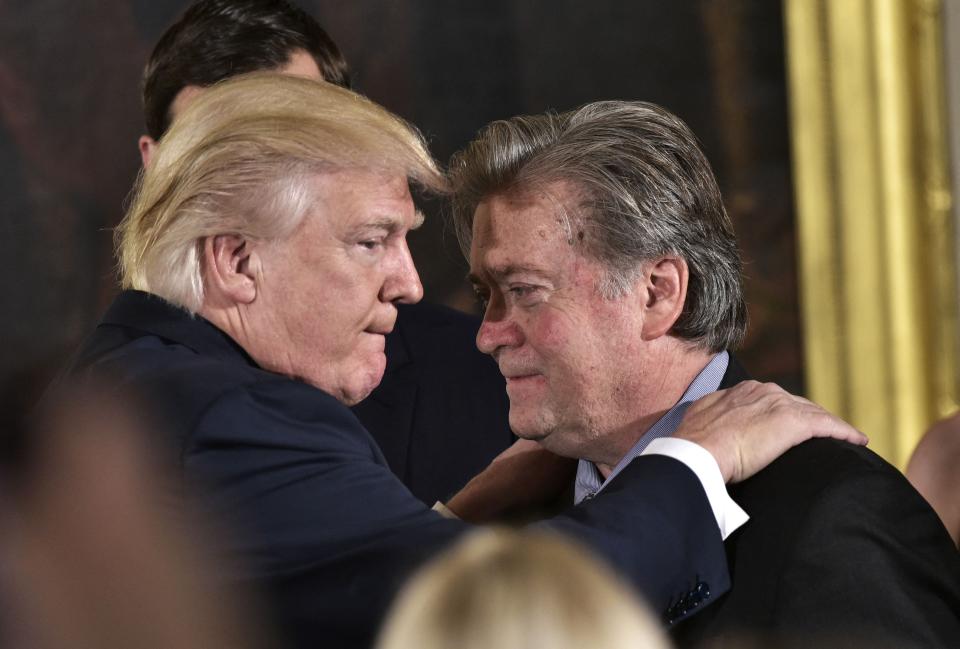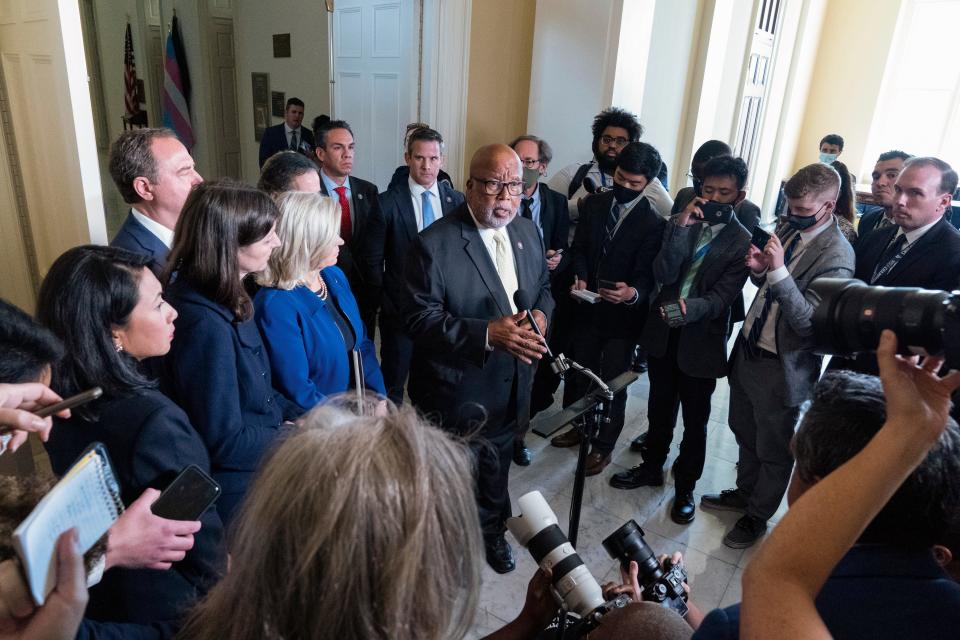The Jan. 6 committee will vote to hold Bannon in contempt. Here's what we know
WASHINGTON – The House Select Committee investigating the Capitol attack in January will vote Tuesday to begin contempt proceedings against former Trump adviser Steve Bannon after he refused to cooperate with the panel's subpoena.
Now, the committee is ramping up its efforts to compel him to testify and deter others they have subpoenaed from not cooperating.
More: January 6 committee seeks to hold Steve Bannon in contempt as ex-Trump aide refuses subpoena
Rep. Jamie Raskin, D-Md., a member of the Jan. 6 commission, told USA TODAY last week, “If you don't show up for a subpoena, and you just blow off a government order, that's a crime.”
Here's what we know about Tuesday evening's vote from the Jan. 6 select committee:
Who is Steve Bannon?
Bannon, 67, served a prominent role in Trump's first campaign for president, then as White House chief strategist for the first few months of the Trump presidency until he left in Aug. 2017.
He was once one of the most divisive figures in politics, who in 2017, helped spearhead the so-called "Muslim ban" and craft Trump's rhetoric blaming "both sides" after a white supremacist rally in Charlottesville, Virginia.
His departure came amid intense public pressure after the deadly clashes between white supremacists and counter-protesters in Charlottesville.
More: Lawsuit over Charlottesville 'Unite the Right' rally has crippled white supremacist groups, leaders

Prior to his involvement with Trump, Bannon was a founding member and executive chairman of the far-right media company, Breitbart News. After his time at the White House, he returned briefly to the network before leaving again in 2018. He then focused on creating pro-Trump and far-right content, including a documentary and an online podcast program entitled "War Room".
Bannon is known for his alignment with the so-called alt-right movement and comments like calling for Dr. Anthony Fauci, America's top infectious-disease expert, and FBI Director Christopher Wray to be beheaded. He was banned from Twitter in 2020 for those comments.
Before he left office, Trump pardoned Bannon, who was awaiting trial after being accused of defrauding hundreds of thousands of donors in the "We Build the Wall" crowdfunding campaign that raised $25 million.
'Rewrite history:' Trump and allies downplay Jan. 6 violence at the Capitol
Recently, Bannon has been headlining Republican party events and advising GOP candidates across the country, like Republican gubernatorial candidate Glenn Youngkin. A rally he spoke at earlier this month featured a Pledge of Alliance to an American flag that, according to organizers, flew at the Jan. 6 pro-Trump rally that preceded the Capitol riot.
According to the book “Peril” by Washington Post journalists Bob Woodward and Robert Costa, Bannon was talking to Trump on the phone months before the Capitol riot about Jan. 6, the date when lawmakers were meeting to count the Electoral College votes to confirm the victory of now-President Joe Biden.
"Bannon told Trump to focus on January 6. That was the moment for a reckoning," the authors wrote about one of the many conversations about the electoral vote counting process.
Bannon was not a White House staffer on or before Jan. 6, having left the administration years earlier.
More: Trump attorney's memo to Pence outlined procedure to overturn election: reports
Why is Bannon refusing to cooperate?
Trump's lawyers have directed witnesses not to cooperate with congressional investigators, invoking executive privilege. But the Biden administration has rejected the former president's attempt to withhold documents from the investigating panel.
Bannon's legal team formally notified the committee of Bannon's intention to refuse investigators' requests, citing executive privilege.
"Since executive privileges belong to President Trump, and he has, through his counsel, announced his intention to assert those executive privileges ... we must accept his direction and honor his invocation of executive privilege," defense lawyers told the committee.
Bannon also failed to provide documents to the panel by a deadline earlier this month.
More: Biden blocks attempt by Trump to withhold White House documents from Jan. 6 probe

What is contempt, and what happens after tonight's vote?
Being held in contempt means to be considered by a court to have intentionally broken the law for disobeying a court order.
The select committee investigating Jan. 6 has a few options regarding holding Bannon, and others, in contempt.
Contempt of Congress means someone has obstructed the work of Congress or a congressional committee.
The committee has publicly indicated they want to pursue criminal contempt, which could lead to possible jail time and fines, according to the Constitution Center.
If the committee approves the criminal contempt report Tuesday evening, the referral would go to the House floor for a vote, and House Speaker Nancy Pelosi, D-Calif., would refer it to the Department of Justice.
More: Bannon will be held in contempt. What does that mean, and what powers does Congress have?
The Department of Justice would decide whether to prosecute, and the courts would decide whether a violation occurred.
The committee could also pursue civil contempt, which would pursue a civil lawsuit to force testimony, but that process could drag. During Trump's presidency, the House tried this approach several times, but the process sometimes took years to resolve.
They could also try inherent contempt, which is less likely, as it hasn't been invoked for nearly a century. Under inherent contempt, the Sergeant-at-Arms would bring an individual ignoring a congressional subpoena before the House and try them at the bar. That person could be imprisoned or detained until they agree to comply, but not past the end of a session.
Raskin told USA TODAY if other witnesses also ignore their subpoenas, they may pursue holding others in contempt as well, saying, “We'll take each case on their individual merits, but nobody has the right to blow off the Congress of the United States.”
The committee has also subpoenaed former White House chief of staff Mark Meadows, longtime Trump social media director Dan Scavino, former Justice Department official Jeffrey Clark, who lawmakers say repeatedly attempted to use his position to overturn the 2020 election and Kash Patel, the chief of staff to the acting Defense secretary on Jan. 6.
What is the Jan. 6 committee?
Pelosi created the select committee over the summer, appointing seven Democrats and two Republicans to the commission.
More: Meet the members of the House's January 6 select committee
The committee is investigating the events surrounding, and leading up to, the insurrection attempt when a pro-Trump mob battled police, broke into the Capitol, and sent members of Congress fleeing.

Who are the members of the Jan. 6 committee?
The committee is chaired by Rep. Bennie Thompson, a Democrat from Mississippi and chairman of the House Homeland Security Committee.
Rep. Liz Cheney of Wyoming is one of the two Republicans appointed by Pelosi to the select committee. She has been critical of the Republican party since the Jan. 6 attack, including condemning Trump for his rolewhile also calling, then later voting, to impeach him.
More: Liz Cheney vs. Trump: The feud forcing Wyoming to ask hard questions
She was ousted from GOP leadership earlier this year for these positions.

Others on the committee include:
Rep. Adam Kinzinger, R-Ill., an outspoken and critical member of the GOP. He was one of the ten Republicans who voted to impeach Trump after the insurrection.
Rep. Elaine Luria, D-VA., a retired Navy commander, told 13 News Now that she believes Pelosi chose her to serve because she’s the longest-serving active duty member in the caucus and that she sees her role as a continuation of the oath she took both in the Navy and in Congress.
Rep. Jamie Raskin, D-Md., a constitutional law professor, garnered national attention when he served as lead House impeachment manager for Trump’s second impeachment, which was over the insurrection.
Rep. Stephanie Murphy, D-Fla., co-chairs the Blue Dog Coalition in the House and serves as Chief Deputy Whip of the House Democratic caucus.
Rep. Pete Aguilar, D-Calif., serves on the House Appropriations Committee and House Administration Committee, which oversees the United States Capitol Police force.
Rep. Adam Schiff, D-Calif., the lead impeachment manager in Trump’s first impeachment trial.
Rep. Zoe Lofgren, D-Calif., was also involved in prosecuting one of Donald Trump's impeachment trials. The House Administration Committee, which Lofgren chairs, has held hearings focused on the reaction to the Jan. 6 attack on the Capitol.
Pelosi's action to compile the committee came after Republican resistance in both the House and Senate.
The Senate rejected legislation in May that would have created a bipartisan commission to study the Capitol riot.
Then, the House passed separate legislation to create the House panel. House Minority Leader Kevin McCarthy, R-Calif., pulled his choices of Republicans from participating in the committee after Pelosi rejected Republican Reps. Jim Jordan of Ohio and Jim Banks of Indiana, two of his five appointees to the committee, saying that they would undermine the integrity of the committee.
More: At January 6 hearing, officers recall brutal riot, ‘desperate struggle’ to hold back mob
So far, the committee has had one public hearing, in July, where a panel of USCP and Metropolitan Police officers described in detail the horrors and violence they witnessed from that day.
Contributing: Rick Rouan, Sarah Elbeshbishi, David Jackson, Kevin Johnson; The Associated Press
This article originally appeared on USA TODAY: January 6: Here's what we know about holding Steve Bannon in contempt

 Yahoo Movies
Yahoo Movies 
